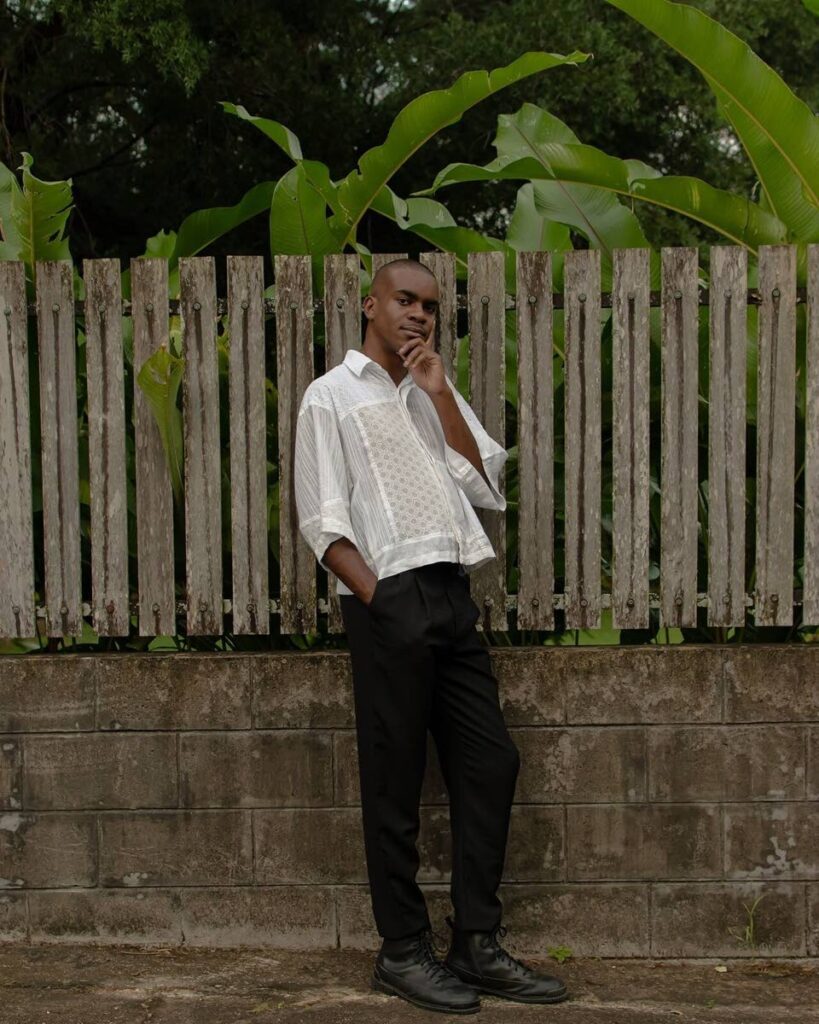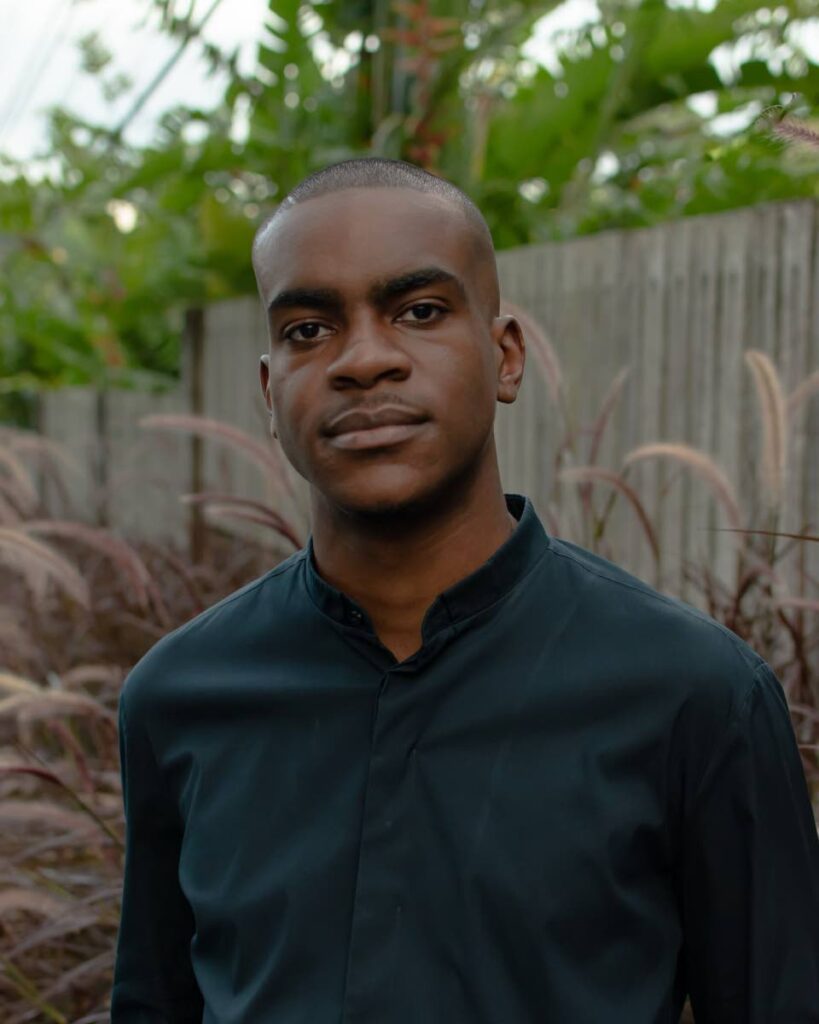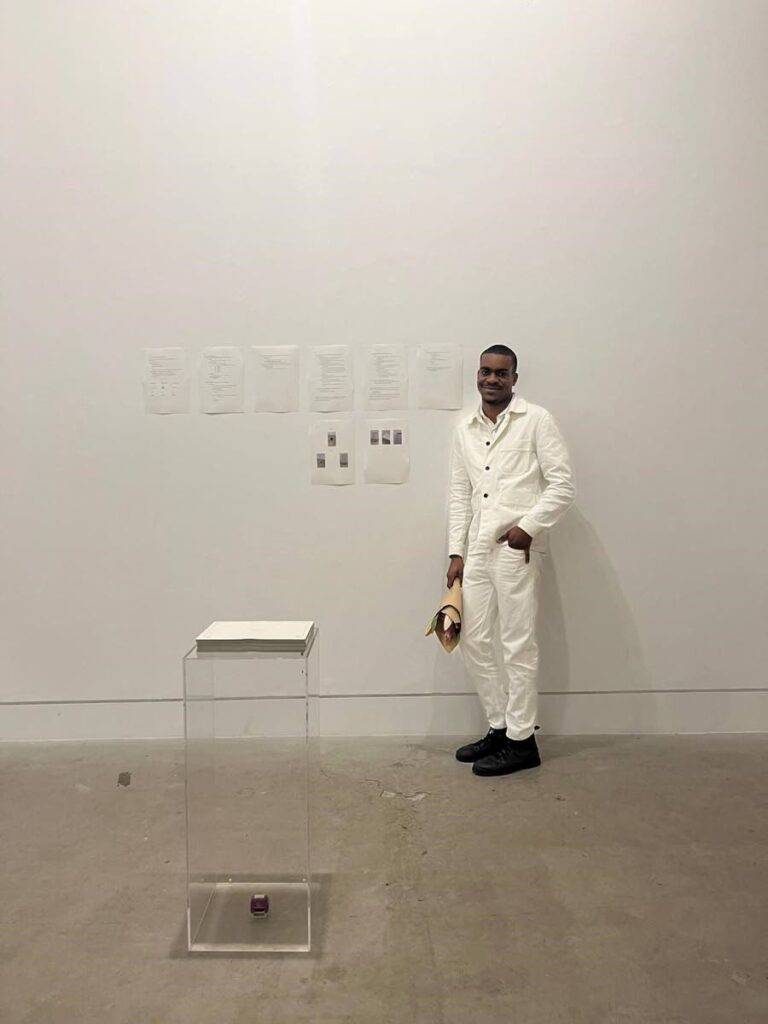Che Applewhaite creates spaces of belonging

LONDON-based artist, writer and filmmaker Che Applewhaite says a crucial part of his art is creating “spaces of belonging” and a sense of community.
“For me, it’s more important to make spaces of belonging and make the things that people can, in truth, commune around.”
Applewhaite, 25, was born in Trinidad and migrated to London at three. He moved to the US at 17 to study at Harvard University, where he initially applied to study economics, but switched to art.
This switch was inspired by art shows he saw in London, as he connected emotionally to the worlds the artists built and how they presented what they were experiencing in their lives.
“The time I’ve spent looking at art was me preparing to be an artist, and now this is the time I can make my own work.”
He finds inspiration from artists “who have been able to, in astonishing ways, question the way that we live” but also present their own perspective meticulously and beautifully.
These include American-born writer and activist James Baldwin and Guyanese-born painter Frank Bowling as well as some of his Trinidad and Tobago peers such as writers Katherine Agyemaa Agard and Desiree Bailey.
Applewhaite, who primarily works with analogue and digital media to create hybrid documentary pieces, said, “What that basically means is, I mix things up from archives – from institutional archives like the National Library and Information System Authority (Nalis) or National Archives of TT, then a bit more personal, like the photos you might have in your bedroom or from your grandparents.
“I put these in different forms like writing, film and now sculpture.”
He is one of ten artists chosen as part of the Jerwood Survey III biannual exhibition. This is a touring exhibition that presents work by ten early-career artists across the UK, during which he is presenting a sculpture titled Handle With Care. In collaboration with Jerwood Survey III he also has a residency at Somerset House, London, now a cultural centre, from April 2024-October 2025.

Displayed in the studio, Handle With Care at first glance displays several pieces of paper on a
plinth and eight on a wall. On greater study, this work tells a deeper story and offers various points of reference.
Applewhaite is interested in reimagining and disrupting the idea of power as it pertains to African people over the past 400 years.
He said this work is “inspired by and working with” that of Cuban-born artist Félix González-Torres, a queer Cuban artist who died in the US during the Aids crisis, in 1996.
He produced a series of minimalist visual installations made of everyday materials like stacks of paper, wall clocks and lightbulbs. These installations at times offered an interactive component and proposed new ideas of power to public audiences.
The reference to González-Torres’ work can be seen in Applewhaite’s piece in both its minimalist display and interactive element. The sculpture presented in studio hosts pieces of paper that direct viewers to a landing page. This landing page hosts a poem written by Applewhaite through an auto-fictional character named RPJ.
An autofictional character is created when an author wants to integrate personal and fictional experiences for the purpose of telling a story. For Applewhaite, this was necessary to retain a sense of privacy.
The landing page has a downloadable document titled Handle With Care. Here one will see a series of five images, each with its own write-up. These images and writings touch on experiences of RPJ’s past, expressions of their desires, feelings of hurt and recounts of injustices experienced in society.
In the piece RPJ speaks about Ornella Greaves, a pregnant woman and mother of five, who was shot dead by police on June 30, 2020 at a protest at Beetham Gardens. Residents were protesting the police shooting of Joel Jacobs, Israel Clinton and Noel Diamond in Morvant on June 26, 2020.
Applewhaite, while in Trinidad in 2022, was made aware of this through his acquaintance with human-rights educator and activist Adeola Young, founder of the NGO Groundation, which seeks to protect people from police brutality mainly in east Port of Spain.
This incident resonated with Applewhaite, as he saw police brutality as more than just a TT issue, but rather an international one.
“These violences are international and so our solidarities also need to be international. That’s where the work becomes an opening to invite people to find solidarity with these experiences and struggles.”

Handle With Care also touches on the personal grief Applewhaite was feeling over the deaths of his grandmother and grandfather. He says his personal grief, along with the external grief he saw while visiting Trinidad from 2021-2022, led him to create this.
“I was thinking about how to reckon with all this grief, the rapes, the anger, the anxiety, the moments of depression, the sadness that was really weighing on my heart towards the end of 2022. What I realised was, if I contained it I would have been eaten alive by these feelings.”
To create this work Applewhaite said he had to look inside himself and ask, “How much longer are you going to hide from your truth?”
It was a release for him to create Handle With Care and now that it is being exhibited he says he feels “a lot lighter” and is “moving into an era that’s lighter and more playful.”
Applewhaite says he’s the only artist out of the ten chosen for the exhibition who is showing work made outside the UK and for him it is important, specifically as a first-generation immigrant.
“For me it’s important that that perspective is exhibited around the UK. I’m very glad that I’m doing that work in a time, in the UK, where people are becoming more nativist.”
Although he has had his work displayed before, creating this piece allowed him to have his first opening (in April), which he describes as “beautiful.”
Seeing the feedback from the opening has given him the confidence to continue making work, he said.
To be part of the exhibition, one had to be nominated. He was nominated by artist and filmmaker Sin Wa Kin, who was nominated for the Turner Prize in 2022. They are now both residents at Somerset House in south London, which Applewhaite says has been labelled the home for cultural innovators.
“It feels perfect for my work and I feel grateful that there’s this mutual recognition of my work.
“Also it does feel like a step up for me in my practice, where I am now resourced with an institution’s backing.”
He plans to continue creating art and believes when he releases work, it’s not about him. He considers it a job.
“I’m doing this work because I feel connected to people who I’m working with and I feel connected to the stories that people have entrusted me to share.”
He says being an artist and an immigrant has made him more aware of the inequities Caribbean people work from and he feels more galvanised to question the systems at play that prevent poorer and less supported people from expressing their point of view in a public space.
“As it becomes more considered a job for me, I feel it’s a calling.”

Comments
"Che Applewhaite creates spaces of belonging"